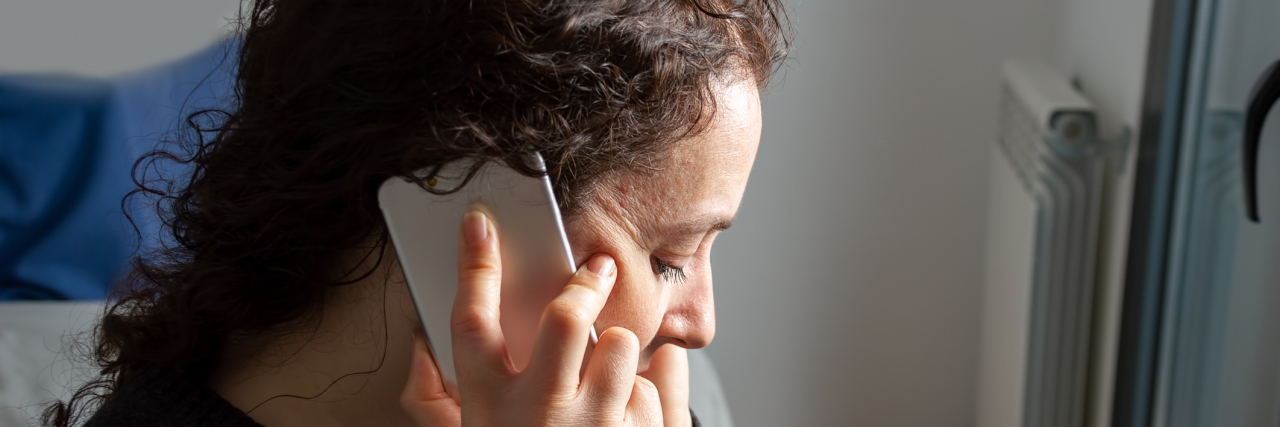I spent years struggling with mental illness, being institutionalized and feeling powerless. I was diagnosed with atypical schizophrenia as well as an autism spectrum condition in the mid-1990s. In 2000, I set out on a new path, enrolling in a university course, hoping to find professional employment someday. In 2007 I joined the Australian Public Service as a college graduate. I felt on top of the world. Mental illness was the furthest thing from my mind. I moved to a new city and ditched my psychiatrist. I was ashamed of my past, of my dependence on welfare benefits and supported housing. I was a new person and I didn’t think I would ever need help from anyone. I bought a little apartment and imagined my illustrious future, for surely I would be a senior executive before long. I was respectably middle class. I had a mortgage and nice jewelry.
In 2009 my life took a difficult turn. There was a leaking tap in the apartment upstairs which seeped into my wall. The paint bubbled and puckered and I had no idea what to do. Shortly after that was fixed I saw bubbling paint behind my bookcase. My own shower was leaking and I was plunged into extreme anxiety. After many plumbers, tilers and $3,000, it was fixed, but my brain was broken. In my world, every moment was filled with anxiety and terror. My apartment was an enemy. I lay in bed each night waiting for the walls to fall down around me.
I didn’t understand what was happening. My mood was as low as it could be. I thought I was dead and in purgatory. God was punishing me. I somehow dragged myself to work most days, but the days were filled with intrusive thoughts telling me to assault my managers and colleagues, which terrified me. I took a trip to the local portrait gallery and had a strong urge to take the pictures off the wall and turn them around so they wouldn’t scare me anymore.
It did not occur to me that I could access assistance. I drank cups of tea and took vitamin B tablets, thinking these would make me better.
One night I was watching TV. My mood went to the darkest place and I realized I was in trouble. Desperate and not knowing who to talk to, I called the police. They could tell I was in trouble, too. Two officers arrived a short while after my call, knocking loudly on my door. They took me to hospital where I saw the psychiatric nurse on duty. I didn’t know what to tell him. He asked if I was still going to work. When I responded that I was, he sent me home. I cried. I felt completely alone and helpless. I saw my entire future in purgatory. Nobody could help me.
I sat at home alone, terrified and doing nothing. One day I called the telephone counseling service Lifeline. I can’t remember what I said, but the woman on the phone asked me, “Has someone hurt you or are you sick?” I responded that I was sick and opened up to her about what was going on in my life. She told me to call my mom. I didn’t feel able to do this. I felt like I was giving up my independence, but I had promised the counselor I would ask my mom for help. I made possibly the most important call of my life — asking my parents to help me because I couldn’t cope by myself.
My parents drove for four hours to see me. My mom advocated for me so I could get help. I was admitted to the hospital and my recovery journey began. Letting go of my sense of independence and control was one of the hardest things I have ever done, but I think it saved my life. I gradually started to understand what was happening and accept my illness. I understand a lot more about my schizophrenia and how important it is to manage my health, take medication as prescribed and be aware of when things are getting to a critical point. My relationship with my mom and my dad is infinitely stronger, too, and I know that I don’t have to do everything myself. It really is OK to ask for help.
The experience has given me a lot of insight and understanding about myself. I’m actually quite grateful, in a way, that I became unwell when I did because it has taught me so much. I recently co-wrote a book about managing mental illness for people on the autism spectrum. A lot of my own experience has informed the book. And I’m now the first person to put my hand up and say I need help.
Getty image

